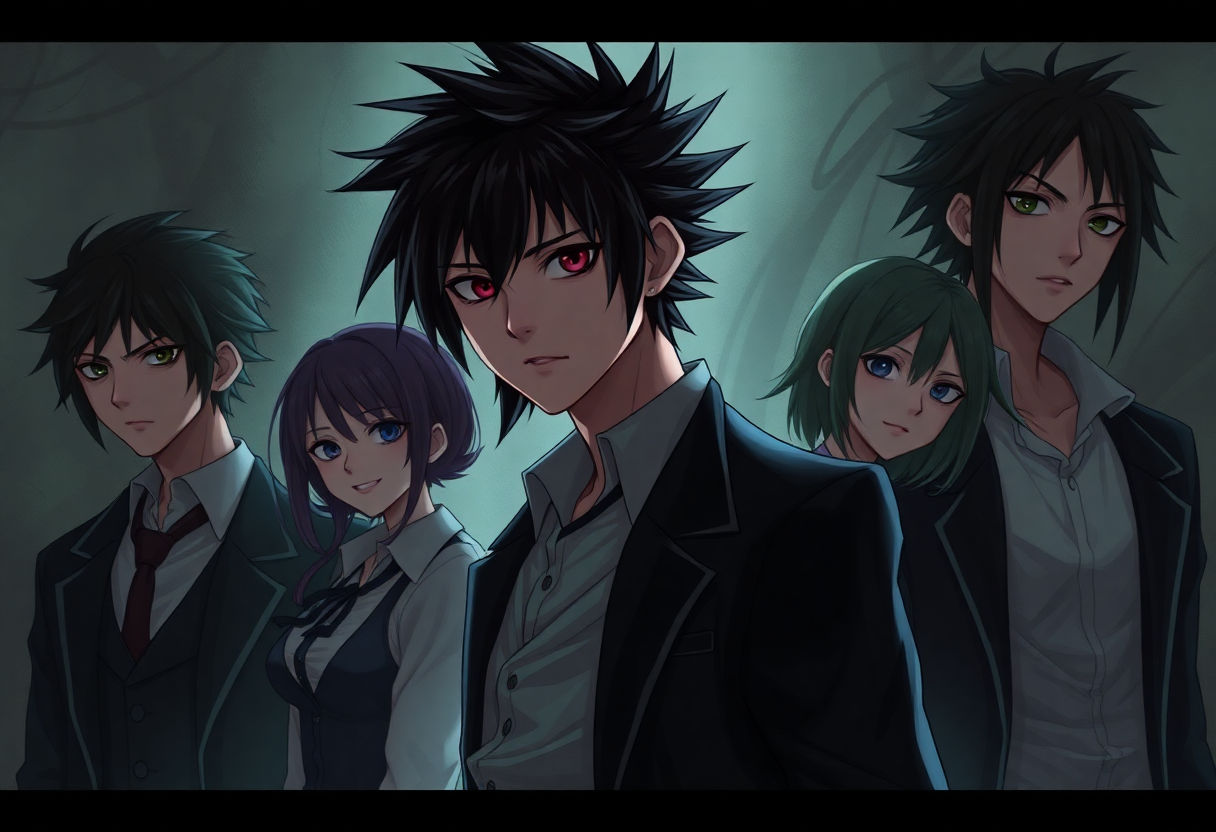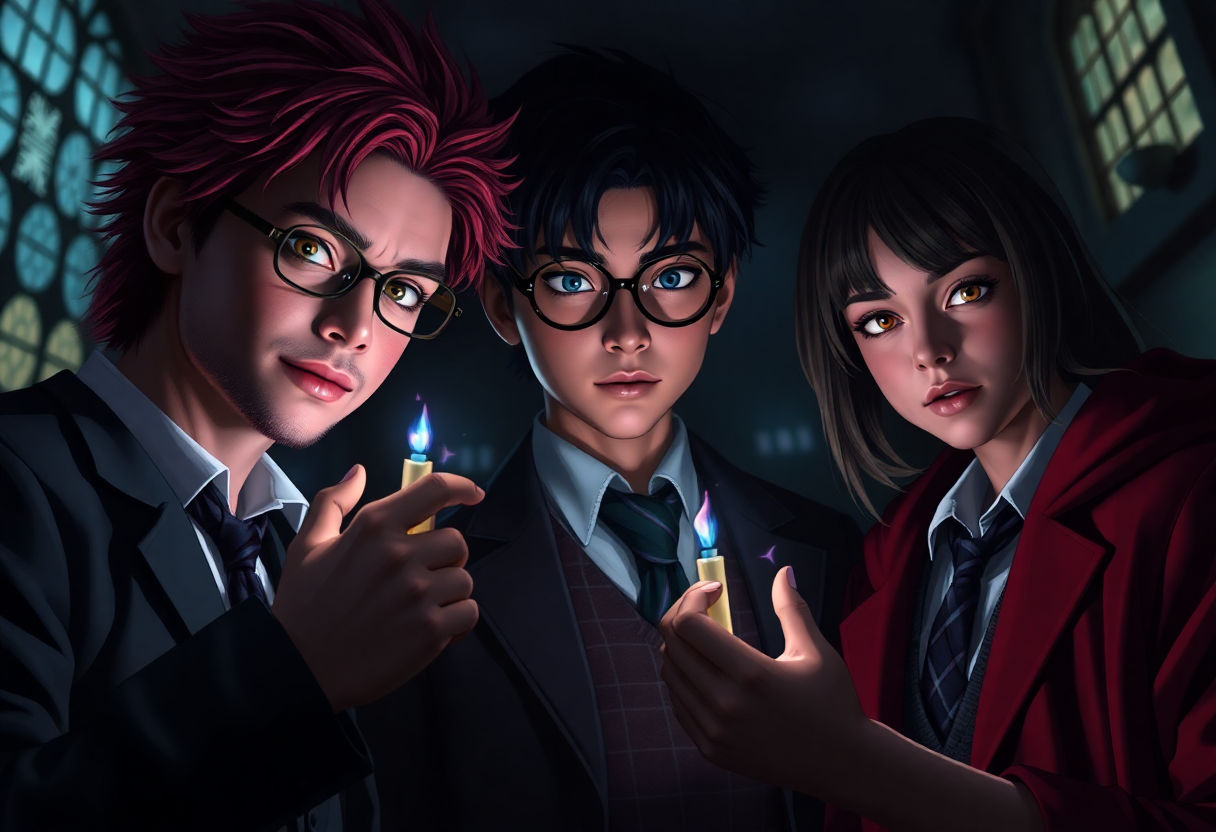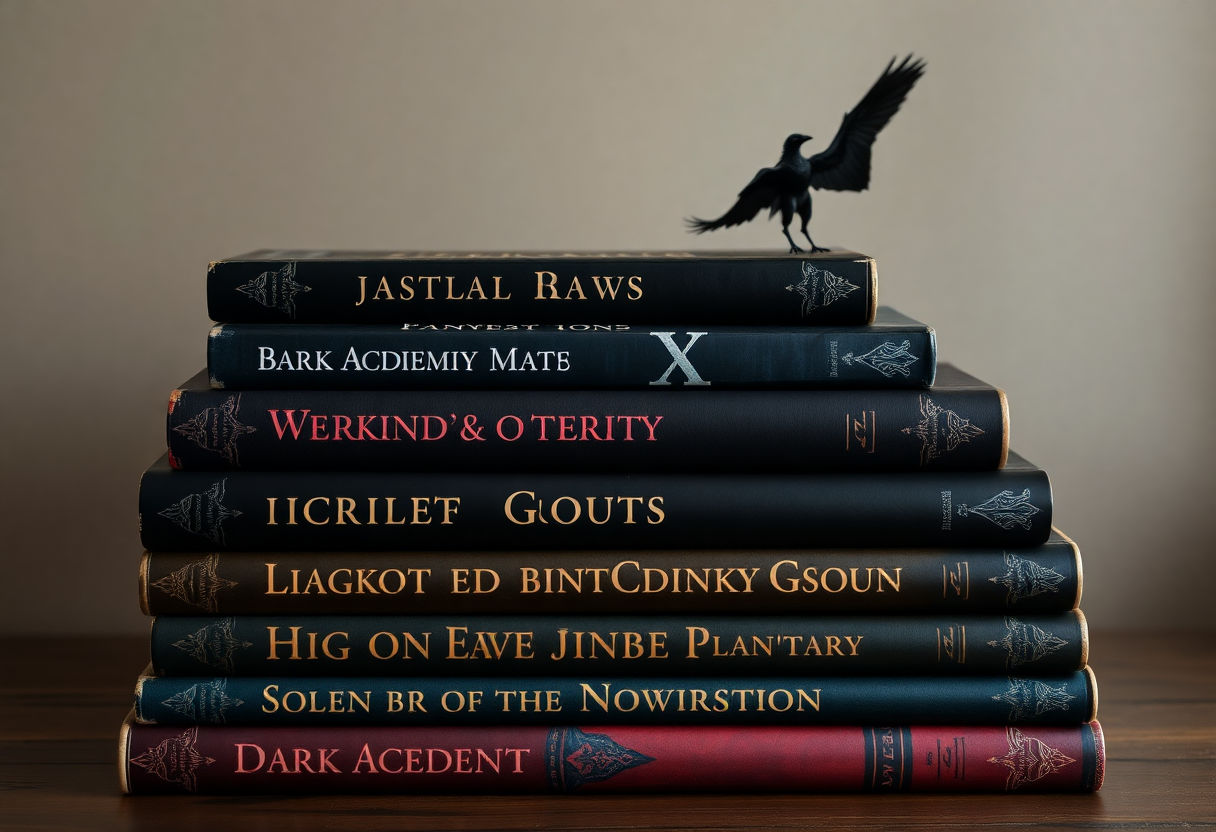Enter the captivating world where the intellectual pursuits of dark academia blend seamlessly with the intricacies of fantasy. This exploration unveils novels that transport readers to realms where mystery intertwines with magic, offering a unique literary experience. From the gothic charm and introspective narratives of dark academia to the enchanting allure of mythical lore, each novel presents a distinctive tapestry of themes and settings. Immerse yourself in stories set amidst ancient libraries and secluded campuses, featuring enigmatic characters whose quests for forbidden knowledge redefine the boundaries of reality. Discover how these novels have reshaped contemporary culture and continue to enchant readers.
Key Takeaways
- Dark academia fantasy novels seamlessly weave intellectual and mystical elements, creating a unique genre that captivates readers with its blend of academic intrigue and magical allure.
- These novels often feature gothic settings and introspective characters, exploring complex themes such as forbidden knowledge and personal identity.
- The atmospheric environments, often characterized by ancient libraries and secluded campuses, are crucial in establishing the mood and tone of dark academia stories.
- Common character archetypes, including the enigmatic professor and the inquisitive student, enhance the narrative depth and emotional resonance of these novels.
- The influence of dark academia extends beyond literature, significantly impacting popular culture, fashion, and social media trends.
The Unique Allure of Dark Academia
Dark academia has captivated audiences with its unique allure, combining the intellectual rigor of academia with the shadowy mysteries inherent in its gothic elements. This genre’s charm lies in its ability to transport readers to an environment where knowledge is exalted, yet it whispers of the forbidden.
Gothic elements infuse dark academia with an air of mystery and antiquity. The architecture often features looming structures, ivy-clad stone edifices, and elaborate libraries that serve as gateways to the past. These settings create a perfect ambiance for stories steeped in exploration and introspection. The focus on academia offers a compelling narrative framework, allowing authors to delve into themes of enlightenment and the pursuit of knowledge.
Central to the genre are its introspective characters, often depicted as inquisitive scholars or enigmatic professors. These characters are not merely seekers of knowledge but also explorers of the human psyche, grappling with their own identities and moral complexities. Their journeys are not simply about acquiring information but understanding the depths of existence.
A key feature of dark academia is its embrace of Romantics’ ideal—the reverence for beauty and intellect, tempered by the stark realities of ambition’s costs. It emphasizes themes such as the pursuit of forbidden knowledge, where curiosity may lead to enlightenment or doom. This tension creates a compelling narrative that resonates deeply with readers who are drawn to stories that illuminate the darker facets of the human experience.
In essence, the allure of dark academia lies in its ability to intertwine the cerebral with the mystical, crafting tales that are as thought-provoking as they are spellbinding.
The Intersection of Fantasy and Academia
In the realm of dark academia, the mesmerizing allure of fantasy breathes life into scholarly tales, transforming academic pursuits into magical adventures. This synthesis results in narratives where ancient tomes become portals to other worlds and hallowed halls conceal untold secrets of the mystical.
Fantasy in dark academia often serves to broaden the horizons of the literary world it encapsulates. It introduces elements of magic, mystical creatures, and arcane lore, enriching the academic quest for knowledge with supernatural dimensions. These elements enable characters to transcend ordinary educational experiences, inviting readers to explore the enchantment cloaked within the familiar settings of libraries and lecture halls.
In this genre, the juxtaposition of the traditional academic environment with fantastical elements highlights the enigmatic nature of both disciplines. The structured, logical pursuit of knowledge inherent in academia comes alive with the unpredictable, chaotic energy of fantasy. Characters often embark on quests not just for intellectual gain, but to uncover hidden truths accessible only through sorcery and mythical exploration.
Notable tropes within this intersection feature protagonists who grapple with the dichotomy between the learned and the mystical—a reflection of their internal struggle balancing reason with imagination. This blend captures the timeless human quest for enlightenment through both rational thought and belief in the extraordinary.
Thus, the intersection of fantasy and academia not only elevates narratives but invites readers to ponder the infinite possibilities where knowledge and imagination collide, offering a profound exploration of the very essence of mystery and wonder.
Top Dark Academia Fantasy Novels
Top Dark Academia Fantasy Novels
Dark academia fantasy novels transport readers into a world where mysticism intertwines with academia, creating an enigmatic tapestry of intellectual and magical intrigue. These novels are often characterized by their moody atmospheres, profound philosophical undercurrents, and richly layered narratives.
-
“The Secret History” by Donna Tartt: Often considered the quintessential dark academia novel, Donna Tartt’s The Secret History delves into the life of a group of elite students at a New England college who become entangled in a world of murder and mysticism. The novel skillfully explores themes of classicism, morality, and the pursuit of forbidden knowledge.
-
“Ninth House” by Leigh Bardugo: This recent addition to the genre blends academic rigor with the supernatural. Centered on Yale University’s secret societies, Ninth House follows Alex Stern as she navigates a world of dark magic and hidden conspiracies, presenting a gritty, spellbinding narrative.
-
“A Deadly Education” by Naomi Novik: Set in a magical school, this novel follows the story of Galadriel “El” Higgins, a student battling dark forces within an institution where failure means certain death. Novik’s inventive world-building offers a fresh take on the familiar trope of magic-bound academia.
These novels exemplify the fusion of dark academia and fantasy, each offering a unique window into a genre that captivates readers with its exploration of the arcane and the intellectual. Whether through an exploration of mystery or the presentation of a spellbound academic setting, each novel challenges the notion of what it means to seek knowledge in a world fraught with otherworldly dangers.
Themes Explored in Dark Academia Novels

Dark academia novels intricately weave a tapestry of themes that captivate readers, luring them into a world steeped in mystery and intellectual allure. Central to these narratives is the pursuit of forbidden knowledge, a recurrent theme that poses compelling ethical dilemmas. Characters often find themselves drawn to ancient texts and arcane wisdom, challenging societal norms and confronting the consequences of their intellectual curiosity.
Identity is another profound theme, as characters embark on introspective journeys within the corridors of academia. These narratives frequently explore the tension between one’s true self and societal expectations, with protagonists often undergoing a transformation as they grapple with personal and philosophical conflicts.
An intriguing blend of myth with academia characterizes these novels, where the lines between reality and fantasy blur. This synthesis enhances the narrative depth, as mythical elements such as occult practices or ancient deities intertwine with scholarly pursuits. It serves as a metaphor for the hidden layers of human knowledge and the enigmatic aspects of existence.
Additionally, the theme of friendship and rivalry is prevalent, often set against the backdrop of elite academic institutions. These relationships are marked by intense camaraderie and competition, reflecting the high-stakes environment that dark academia encapsulates. Characters are frequently engaged in intellectual duels, driven by jealousy or admiration, which adds a dramatic tension to the storyline.
Overall, dark academia novels offer a rich exploration of complex themes, combining introspection with a quest for knowledge that continuously fascinates and enthralls readers.
The Role of Setting in Dark Academia

In dark academia fantasy novels, setting is a pivotal element, crafting an atmospheric backdrop that immerses readers in a world imbued with mystery and allure. The quintessential settings of this genre are often reminiscent of historic and gothic architecture, such as ancient libraries, secluded campuses, and grand university halls, which evoke a sense of timelessness and intellectual depth.
These environments serve not only as physical spaces but also as symbolic arenas for the unfolding of the narrative. The ancient libraries, with their labyrinthine corridors and towering bookshelves, become realms of forbidden knowledge, echoing themes of intellectual curiosity and the pursuit of hidden truths. Within these hallowed halls, characters often encounter texts and artifacts that bridge the mundane world with the mystical, blurring the line between reality and imagination.
Secluded campuses offer a sense of isolation that enhances the narrative’s introspective quality. These settings often act as microcosms of society, where characters engage with complex social dynamics and internal conflicts. The eerie stillness of these locales contrasts with the vibrant intellectual pursuits undertaken by characters, amplifying the tension between the familiar and the unknown.
Moreover, the architecture itself—be it gothic spires or ivy-covered stone walls—contributes to the atmospheric tension, creating a mood that is both brooding and enchanting. The dark, foreboding aesthetics of these settings mirror the internal struggles and moral ambiguity faced by the characters, enriching the narrative’s depth and complexity.
In essence, the setting in dark academia fantasy novels is more than a mere backdrop; it is an integral part of the storytelling, shaping the narrative and enhancing the thematic richness of the genre.
Character Archetypes in Dark Academia

Dark academia fantasy novels weave complex narratives around distinct character archetypes that contribute significantly to the genre’s allure. At the heart of these tales is the enigmatic professor, a figure often shrouded in mystery and intellectual prowess. This character serves as a seminal influence, guiding or challenging protagonists with their vast knowledge and cryptic wisdom. Their presence often instigates a quest for forbidden knowledge, a central theme in these novels.
Complementing the professor is the curious student, typically the protagonist who embodies a thirst for knowledge and an innate drive to uncover secrets. These students delve into the depths of academia and magic, embarking on transformative journeys that are both intellectual and existential.
Another frequent archetype is the mysterious outsider, a character whose origins or purposes remain elusive. They often possess hidden powers or secrets that influence the narrative’s progression. This character type adds depth and intrigue, offering alternative perspectives on the unfolding events.
The dark academia landscape is also populated by the tragic hero, characters whose ambitions or flaws lead them to moments of profound realization or tragedy. These figures resonate with classical literary motifs, offering a modern twist on age-old narratives of hubris and redemption.
Finally, the secret society member archetype plays a crucial role in many dark academia stories. These characters often belong to elite groups that guard ancient secrets or wield considerable influence within the story, adding layers of conspiracy and tension.
Each of these archetypes contributes uniquely to the rich tapestry of dark academia fantasy, creating compelling narratives that captivate readers with their intellectual and magical allure.
Impact of Dark Academia on Popular Culture

Dark academia’s mesmerizing influence extends into various aspects of popular culture, sculpting trends and reshaping perceptions. At the forefront, fashion has seen a resurgent interest in classic, vintage attire. Tweed blazers, turtlenecks, and pleated skirts echo the sartorial preferences of academia’s yesteryears, encapsulating a sophisticated yet enigmatic aura.
The literary and cinematic worlds have also been significantly touched by dark academia’s gothic allure. Films and series embracing these themes, such as Dead Poets Society and The Secret History, have gained cult-like followings. These works portray an idealized vision of scholarly life, dripping with mystery and intellectual fervor, which resonates deeply with audiences seeking something more profound than the mundane.
Art and aesthetics on platforms like Instagram and Pinterest serve as digital canvases where enthusiasts curate dark academia-inspired content. Users showcase perfectly cluttered bookshelves, sepia-toned photographs of university halls, and scenes bathed in candlelight. This visual storytelling captures the imaginations of many, fostering a global community grounded in shared appreciation for knowledge and introspection.
Furthermore, social media discussion groups and forums are burgeoning spaces for dark academia discourse, rendering it an accessible cultural phenomenon. Individuals find solace and companionship through the exploration of themes like existentialism and the pursuit of forbidden knowledge.
In essence, dark academia provides a lens through which today’s culture can explore identity and intellect against a backdrop of enchanting mystique. It offers a bridge between tradition and modernity, allowing one to delve into the past while contemplating contemporary life.
Conclusion
Dark academia fantasy novels offer an enthralling blend of intellectual mystery and magical enchantment, carving a unique niche in literature. Their timeless allure lies in the interplay of gothic elements and academic intrigue, highlighting issues of identity and forbidden knowledge. These narratives not only enrich literary landscapes but also inspire cultural trends, signaling their lasting impact. Embracing these novels invites readers to explore a world where knowledge is as powerful as any spell, encouraging a deeper appreciation of both imagination and intellect, vital in our ever-evolving cultural narrative.
Frequently Asked Questions
What defines a dark academia fantasy novel?
Dark academia fantasy novels are characterized by their gothic atmospheres, academic settings, and elements of mystery combined with magical or mythical themes. These books often explore intellectual journeys intertwined with supernatural or fantasy elements.
How does dark academia differ from traditional fantasy novels?
While traditional fantasy focuses heavily on magical worlds and elements, dark academia integrates these with themes of academic pursuit, introspection, and often a darker, more somber tone, set against backdrops such as ancient universities or libraries.
Can you recommend some must-read dark academia fantasy novels?
Some essential reads in this genre include “The Secret History” by Donna Tartt, “The Starless Sea” by Erin Morgenstern, and “The Atlas Six” by Olivie Blake. These novels seamlessly blend academic intrigue with fantastical elements.
Are dark academia fantasy novels appropriate for young adult readers?
Many dark academia fantasy novels are suitable for young adult readers, offering complex characters and engaging storylines while addressing themes that resonate with a younger audience. However, some themes or scenes may be more appropriate for adults.
What themes are commonly explored in dark academia novels?
Common themes include forbidden knowledge, personal identity, and the dichotomy of light and dark within academic and fantasy contexts. These novels often delve into the consequences of intellectual ambition and the allure of hidden knowledge.



